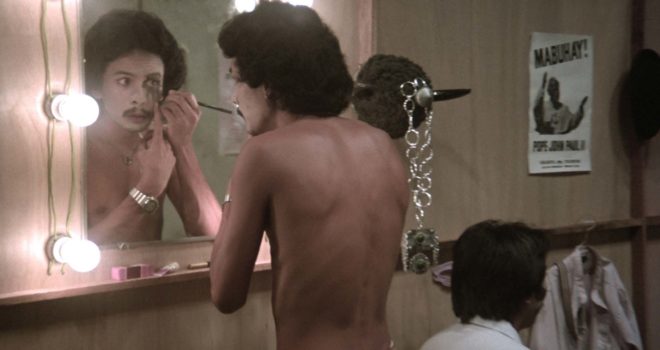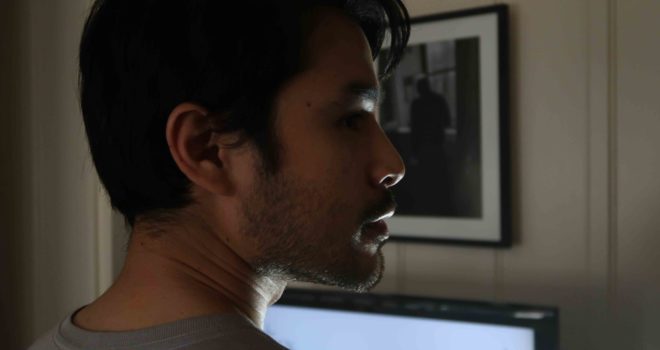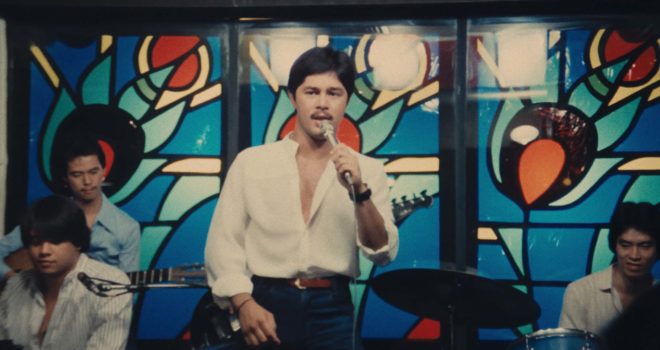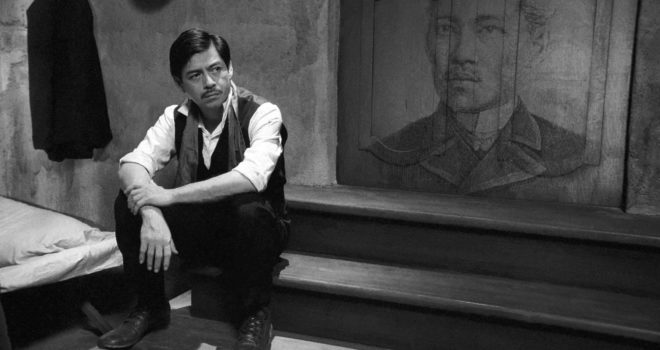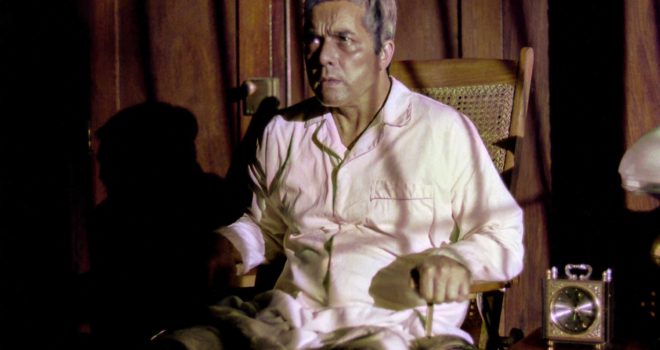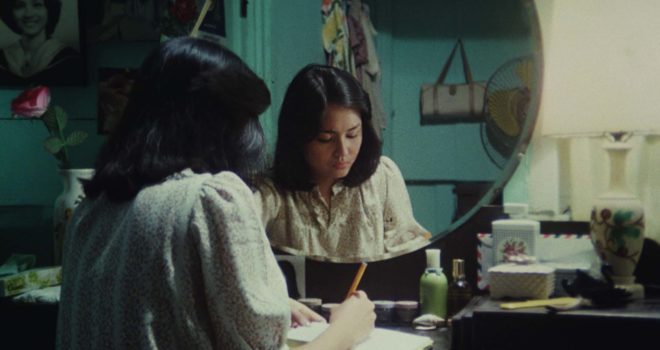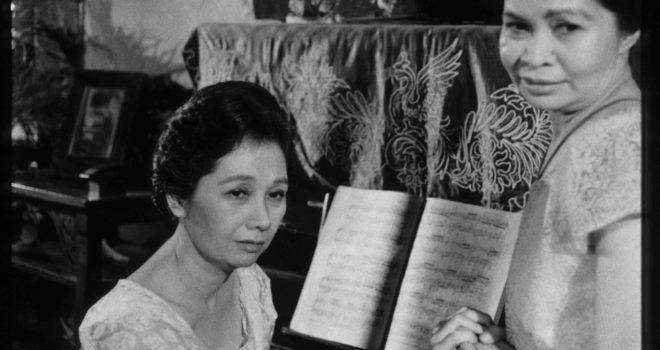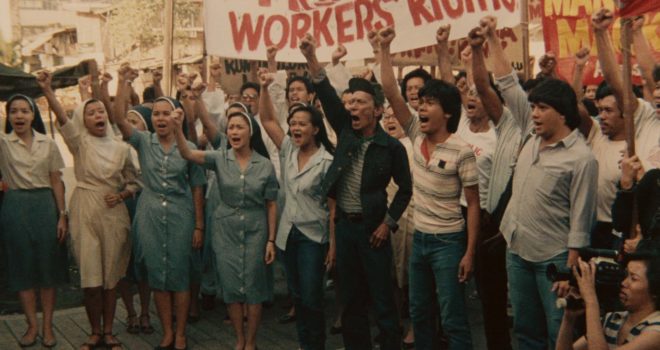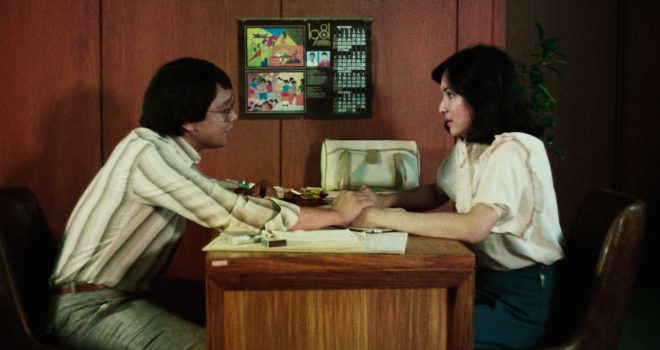
Kisapmata de Mike DE LEON © UNION BANK OF THE PHILIPPINES / MIGUEL P. DE LEON, / Carlotta Films
Those who attended the recent theatrical releases of the works of Lino Brocka, the biggest name in Filipino cinema, may recall having seen Mike de Leon’s name in the credits of Manila in the Claws of Light (Maynila sa mga kuko ng liwanag, 1975). A little-known and thus noteworthy fact is that Mike de Leon was both producer and director of photography for the film. Before the commercial distribution of his films in France in 2023, this world-premiere retrospective reveals a lifetime dedicated to cinema, like his family before him. Psychological thrillers, film noir, love stories, realistic films and fantasies: Mike de Leon’s films avoid being pigeonholed and, as if emerging from the darkness (of his native country), bring to light works imbued with remarkable stylistic power.
Editorial Mike De Leon: A Life in (Moving) Pictures
Many Filipino films have been presented at Nantes and the Festival des 3 Continents opened up twice, in 1981 and 1994, to retrospectives that first of all helped give visibility to an almost unknown cinema, then helped create links between filmmakers who had more or less gathered in the shadow of the totem, Lino Brocka (many of these films unseen in France were screened on these occasions).
At the time when Ferdinand Marcos laid his iron first on the country and introduced martial law (1972-1981) to maintain himself in power by any means until 1986, filmmakers were taking the question of cinema seriously and, more broadly, the question of the Philippines. Although the names of Gerardo De Leon, Ishmael Bernal, Eddie Romero, Laurice Guillen, Mario O’Hara and others are in danger of falling into oblivion in our climes, the recent restoration by L’Immagine Ritrovata and the upcoming release of at least five of ‘Mike De Leon’s films on French screens by Carlotta Films gave us an unmissable opportunity to join forces with them to pay homage to this still active figure in current Filipino cinema, dubbed by some as the “second golden age”.
The films and life of Mike De Leon are inseparable. His father was a producer and before him his grandmother, Doña Narcisa B. Vida De Leon, who became the first magnate of Filipino cinema when she founded LVN Pictures in 1938 (closed in 2005), the largest studio in the country’s history. Mike De Leon started his real film career as both producer and cinematographer – which is not often the case – on Lino Brocka’s Manila in the Claws of Light (1975). His first feature Itim, made in 1976, was awarded at Sydney in 1978, Kisapmata and Batch’81 followed on and had their world premieres at Cannes the same year in 1982! Sister Stella L. (1984) competed at the Venice Mostra. Suffice it to say that during those years, he was a filmmaker whose exoticism counted less than his bold criticism of the norms of Filipino society (patriarchal tyranny, conservatism, Catholic imagery, indoctrination) in films that skilfully mix references to genre cinema (fantasy, family melodrama – based on a news story – or campus film) and to films by European authors (particularly Antonioni, Kubrick). And while Moments in a Stolen Dream (1977) may seem lighter and Will Your Heart Beat Faster? (1980) totally crazy, we can still see in them, as in the filmmaker’s other films, a preoccupation that underpins all his work: a concern for the youth of his country.
In 2018, after two decades in retreat, Mike De Leon made Citizen Jake. The film recounts the confrontation opposing a young idealistic journalist to his father and his corrupt clan of politicians who gained power and legitimacy under Marcos. In the weeks before the last presidential elections in 2022 that brought “BongBong”, the former dictator’s son to power, the film was streamed for free on the Filipino platform Mulat Premiere Cinema. The filmmaker wrote at the time: “ I hear that Marcos Jr. is a shoo-in as our next president. This is the ultimate embarrassment for our country, the ultimate tragedy from which we may never recover. Don’t we realize that a vote for Marcos Jr. is a vote for that entire family from hell, as well as key figures from the most disreputable political families in our history?”
Godard, citing Faulkner, commented: “The past is never dead. It’s not even past.”
The formula holds just as true for the pleasure of finally discovering Mike De Leon’s films, as it does for deploring this sinister return of a history with which his work has always grappled.
Jérôme Baron
Statement by Mike De Leon at the Festival des 3 Continents, November 2022
I would like to express my deepest gratitude to the Nantes Festival des 3 Continents for featuring a full retrospective of my films. There is a saying in Tagalog, my native language, “huli man daw at magaling, naihahabol din.” Or freely in English, something of value may come late but better late than never. I first made my mark in international cinema in 1982 when two of my films were shown at the Directors’ Fortnight in Cannes. Then another film of mine was shown at the Venice International Film Festival in 1984, after which I disappeared from the map. The last time I participated in an international film festival before Cannes Classics this year was in Busan, in 2018, for the film, Citizen Jake. By that time, an entire generation of new Filipino filmmakers had appeared that were making their mark on the international stage. I am told that there are many exciting new films coming from the Philippines today. Unfortunately, there are also state-sponsored films coming from the sewers of Malacañang (Presidential Palace).
One thing that made my films a bit different from most other films coming from the Philippines was that they did not dwell on the depiction of misery and poverty, something international festivals love about films from the so-called Third World. Instead, they dealt with the corruption of the Filipino middle and upper classes, abusive patriarchal rule in the filipino family or the fascist training inculcated in student fraternities. Should I be fortunate to do new work, I will continue to make such films, perhaps a love story about the idle rich wallowing in obscene wealth while worrying whether to attend the next fashion show in Milan, perhaps a black comedy about our political dynasties and their professed deep love and concern for the lives of the Filipinos they work to death, or even torture. These are some of the horrors that have been endemic in our culture and history since the colonial misrule of the Spanish, the Americans, the Japanese, and most recently the brutal rule of our home-grown dictators. We seem to be nurturing a cottage industry of world-class thieves, wannabe tyrants…or wimps. America can learn a thing or two from us, in a reverse kind of colonialism.
But seriously, I am fortunate that my films are gathered in one place, like the ongoing retrospective at the Museum of Modern Art, and here, as well, at the Festival des 3 Continents in Nantes, for audiences to see and judge for themselves their merits or lack of them, or whether I deserve this retrospective at all. In closing, i would like to thank two French men who have believed in my work. Pierre Rissient, who discovered my films, and Vincent Paul-Boncour who rediscovered them.
Thank you all.
Mike De Leon




